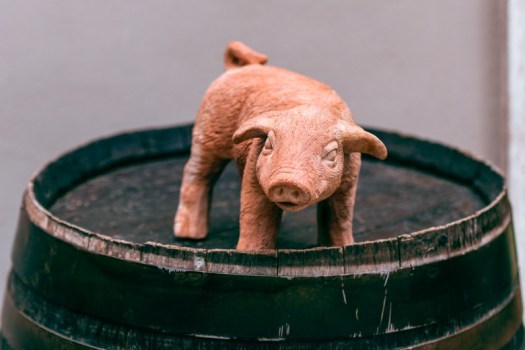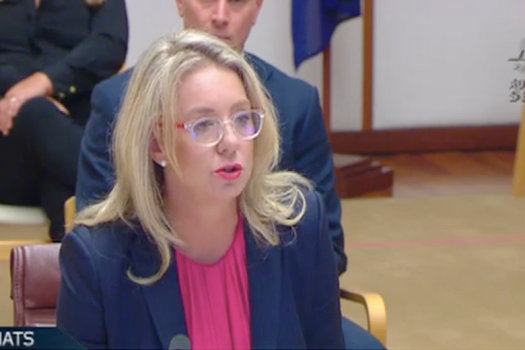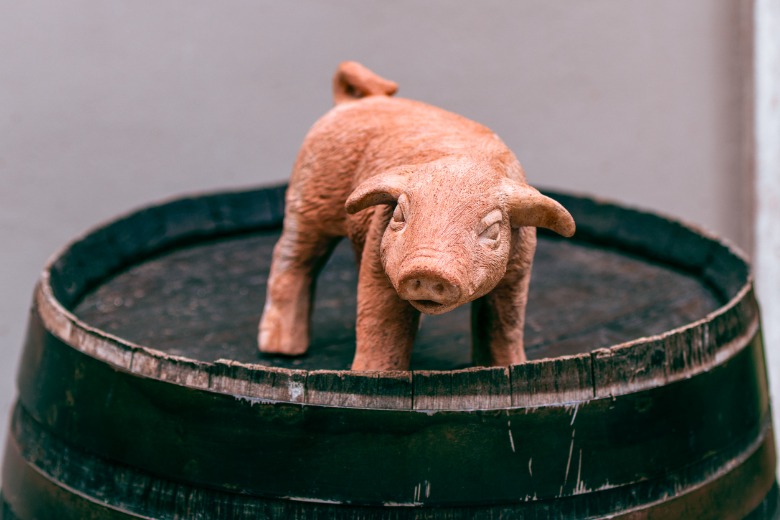
Government-held seats have pocketed the lion’s share of billions of dollars worth of state and federal grants, a report into pork barrelling has confirmed.

The Grattan Institute report, released this week, says of the 19,000 grants allocated by the former federal government under 11 grant programs between 2017-2021, $1.9 billion went to government seats.
Labor seats received only $530 million.
The states demonstrated a similar pattern. In a sample of programs in the three biggest states, government seats got more than one million worth of funding on average, compared to $300,000 for opposition seats.
Marginal seats were also a target of pork barrelling.
“Our analysis of seven federal grant programs from 2017 to 2021 found that marginal government seats were much more likely to receive funding than safe government seats,” the report says.
The report calls for a tightening of the rules designed to prevent grants programs being politicised and recommends more funding for Auditors General to scrutinise grants programs.
Pork barrelling being normalised
“Pork-barrelling – using public money to target certain voters for political gain – is wasteful and undermines trust in governments. But this report shows that pork barrelling is common in Australia,” the report concludes.
This report shows that pork barrelling is common in Australia.
Preventing Pork Barrelling report (Grattan Institute)
Grattan Institute CEO Danielle Wood admits that pork-barrelling is a legal grey area.
“But it’s not good government,” she says. ‘It wastes taxpayers’ money, undermines public trust in our political leaders and institutions and promotes a corrupt culture.”
Ms Wood also expressed concerns about pork-barrelling being normalised, with some politicians now openly defending it.
‘Vote buying’ and ‘rewards’
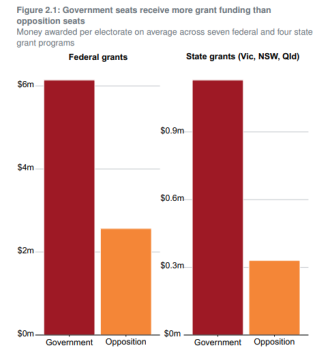
The report says federal and state governments often appear to use grants to ‘reward’ votes in government seats and ‘buy votes’ in marginal seats, with regional grants programs being ‘particularly skewed’.
It highlights a number of recent programs, including the “worst offender”, the NSW Stronger Communities Fund which gave six times as much to coalition-held seats, or $242 million out of $252 million.
“Based on our estimates, Coalition seats got $4 million on average, and Labor seats got $700,000 on average,” the report found.
The $1 billion federal Community Development Grants program allocated more than four times as much on average to government seats compared to opposition seats.
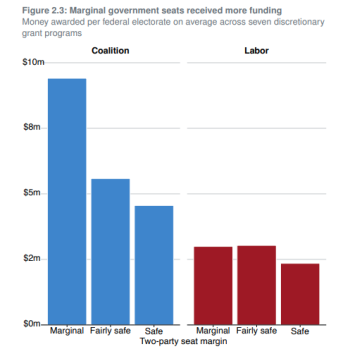
Seventy-seven per cent of successful sites under the $660 million federal Commuter Car Park Scheme were in government electorates.
Government seats received much higher levels of funding under the Community Sport Infrastructure
Program, which became known as the ‘sports rorts’ scandal.
Meanwhile, under the $1.4 billion Building Better Regions Fund, coalition-held regional seats got more than four times as much as Labor-held counterparts, and only one of the 15 regional electorates funded under the Regional Growth Fund was a Labor seat.
The report notes both sides of politics are capable of pork-barrelling. A 2014 audit found the then Labor government approved $90.6 million worth of regional development grants for projects not recommended by the panel – with the rejected projects mainly in Coalition electorates.
Risks and recommendations
It says the main risk factors grants being used to pork barrell included a high degree of ministerial discretion: closed, non-competitive processes; and grants being awarded in the lead up to elections.
Recommendations include:
- ensuring grants programs are open, competitive and merit-based
- removing ministers for selection processes
- esablishing a multi-party standing committee to oversee compliance with grants procedures
- increasing funding for Auditors-General to enable more frequent grants program audits
Comment below to have your say on this story.
If you have a news story or tip-off, get in touch at editorial@governmentnews.com.au.
Sign up to the Government News newsletter
